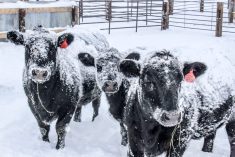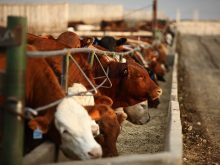CNS Canada –– An ongoing trade battle between China and the U.S., along with general uncertainty in global trade, is starting to put a damper on Manitoba pork prices.
In Canada, the formula price used by domestic farmers is based on the national base price in the U.S. That price is determined by a formula used to calculate values in a number of key U.S. states.
In other words, Canadian prices follow U.S. prices, even if the pork is sold in Canada.
Read Also

U.S. grains: Soy rally continues after Trump says China to expand purchases
Chicago | Reuters – Chicago soybeans extended gains on Thursday, a day after U.S. President Donald Trump said China had…
U.S. daily average slaughter weight prices for cash hogs have been dropping lower over the past couple of weeks, and that trend is starting to be felt here.
The Signature No. 5 (Maple Leaf) Index 100 daily price quote for Friday (Aug. 10) in Canada, was down $18.68 per 100 kilograms (ckg), to $146.84/ckg.
According to Andrew Dickson, general manager of the Manitoba Pork Council, it’s a nervous time for the industry.
“Pork is moving but it’s going at a lower price so producers are getting less money,” he said.
Back in January, a Manitoba producer could have locked in a delivery price for the October contract of $154. Today, if you were going to ship that same animal in the same month you’d be lucky to get $123.
“Who knows how much worse it could get?” he said, noting that at the end of July the price for an animal for delivery in December was just $104/ckg.
Dickson said that amount of money wouldn’t even cover the cost of production, which he estimated at $140 or more.
“The feed alone would be $90 to $100,” he said.
Much of the problem can be traced to oversupply, he said. Four to five years ago market opportunities for North American hog farmers looked very promising. As a result more processing facilities were built in anticipation of higher production.
However, that plan seems to have run into a brick wall, as newfound protectionist measures roil world markets.
“With Mr. Trump deciding to renegotiate NAFTA (North American Free Trade Agreement) and pulling out of TPP (Trans-Pacific Partnership) it has upset the apple cart,” said Dickson. “Now how will it be sold?”
China currently regards Canada as a friendly trading partner but Dickson is worried about recent speculation the Canadian government is thinking of putting tariffs on foreign imports of steel and aluminum.
“If we’re importing steel and aluminum from China they’re not going to be happy if we suddenly put tariffs on their products,” he said, adding pork could be one of the products caught in the crossfire.
Dickson said he has talked to counterparts in the U.S. who are equally concerned about the situation.
“Going into this winter, a lot of producers are going to lose money raising pork in the U.S. and, by extension, into Canada.”
— Dave Sims writes for Commodity News Service Canada, a Glacier FarmMedia company specializing in grain and commodity market reporting.















